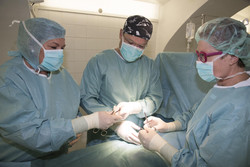Most Frequently Asked Questions about Varicose-Vein Surgery
How many varicose-vein surgeries are performed per year?
Varicose veins are a widespread disease. More than 320,000 patients suffering from varicose veins are operated on in Germany every year.
In what cases is varicose-vein surgery necessary?
The medical specialist (phlebologist) should make this decision after having examined the patient thoroughly. In the preliminary stage, a slight swelling may already indicate venous insufficiency. Without therapy the symptoms worsen and the skin can be affected and even lead to venous-leg ulcer (ulcus cruris), thromboses or life-threatening embolism. The earlier varicose veins are treated, the bigger the chance that the deep vein system recovers so that congestion with its consequences is avoided.
Through what veins does the blood flow back after the varicose-vein surgery?
The superficial veins transport about 10 per cent of the blood from the legs back to the heart. 90 per cent of the blood flows back through the deep veins. If the superficial veins have become varicose veins, then they have lost their transport function. After the varicose-vein surgery, the deep veins are able to transport the entire blood from the leg back to the heart without any difficulty.
How long does the anaesthesia last in the case of a varicose-vein surgery?
Varicose-vein surgeries can be performed under local anaesthesia without any problems. Local anaesthesia conserves the cardiovascular system so that the operation can also be performed on older patients. However, the operation can also be performed under general anaesthesia upon request. The anaesthesia lasts for about 2 to 6 hours, depending on the anaesthetic.
For how long do I have to remain in the clinic after the varicose-vein surgery?
The period of hospitalisation after a varicose-vein surgery depends on the findings, i.e. whether an inpatient or an outpatient surgery is necessary. After outpatient operations, the patients can leave the clinic on the same day. Nevertheless, upon request they may spend the night in the clinic. In case of larger surgeries, the hospitalisation can last for up to 3 days. The hospitalisation can be extended if both legs are operated on or for example in the case of ulcus treatment, lipoedema treatment or thrombosis.
How often do I have to come to the clinic after the varicose-vein surgery?
The follow-up treatment is generally carried out by the referring physician, as well as by the phlebologist, dermatologist or by the general practitioner. The patients can of course come to our clinic for a check-up or to have the stitches taken out. We generally recommend our patients to come to the clinic for a follow-up examination about 6 months after the varicose-vein surgery.
For how long do I have to refrain from getting exercise after a varicose-vein surgery?
We recommend varicose-vein patients to do a lot of walking and hiking. After varicose-vein surgeries, they are allowed to do everything that does not cause any pain. Patients may normally go jogging and bike-riding after 2 weeks, and they can also go swimming after 2 weeks, even in both, warm and cool, water.
Can varicose-vein surgeries also be performed during the summer?
Absolutely! Patients as well as referring physicians still have reservations about varicose-vein operations during the summer. However, there are no arguments against them, neither from a medical nor from an aesthetic-cosmetic point of view. The healing phase is short and, moreover, sunlight does not cause any damages.
How soon can I work again after a varicose-vein operation?
That depends on the operation and on the occupation: e.g. following a radio-wave therapy, the patient can work again 2 or 3 days after the operation. Most of the patients can work again 1 week later. In case of occupations that are physically straining or that require a standing position, it mostly lasts 2 weeks until the patient can work again.
Can varicose veins relapse?
The Capio Vein Centres achieve the worldwide lowest relapse rate (reappearance of varicose veins), which is under 5 per cent. This means that there are bright prospects that a varicose vein, which has been operated on, does not reappear. A frequent cause of seemingly newly occurred varicose veins is, among others, the incomplete removal of the varicose vein during the first varicose-vein operation. For this reason it is recommendable to have varicose veins operated on only by vascular specialists in vein centres that perform thousands of surgeries yearly.
How can one prevent varicose veins?
As predisposition plays a major role in the occurrence of varicose veins, one does not have much influence on them. A lot of exercise and a healthy diet (avoiding overweight) play an important role. Moreover, wearing light compression hosiery (or special journey hosiery, e.g. on journeys by plane or longer journeys by car) can alleviate discomfort.
What kinds of sports have a positive effect on varicose veins?
It is good to get exercise regularly in any case. Sports such as swimming, jogging, vein walking, strolling and bike-riding are good for the veins. Strength training and sports that require abrupt and short strains – such as tennis or squash – are not very favourable.










